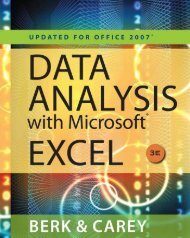How-to-Write-a-Better-Thesis
You also want an ePaper? Increase the reach of your titles
YUMPU automatically turns print PDFs into web optimized ePapers that Google loves.
Appendices <br />
33<br />
Repair words In spoken language we often use what we might call ‘repair’ words<br />
<strong>to</strong> patch up sentences that are going wrong. We can get away with a lot in spoken<br />
language, because we can hear the <strong>to</strong>ne of voice and the pauses while the speaker is<br />
struggling for the right way of saying what he or she means. But in the written word<br />
it just results in a mess. Here is a list of the most common repair words: regard (as<br />
in ‘as regards’ or ‘in regard <strong>to</strong>’); terms (as in ‘in terms of’); aspect; issue or situation;<br />
relation (as in ‘in relation <strong>to</strong>’); compared with or <strong>to</strong> (‘if we look at elephants<br />
we find that they are large compared <strong>to</strong> lions’ rather than ‘elephants are larger than<br />
lions’); address, embrace, and resolve (usually ‘issues’ get these); relative; former<br />
and latter; basically.<br />
I’m not suggesting that these are not legitimate words, but rather that authors<br />
use them <strong>to</strong> fudge things when they can’t really work out what they are trying <strong>to</strong><br />
say. Take, for example, the sentence, ‘One issue that has <strong>to</strong> be resolved is the issue<br />
of housing for low-income people’. The writer is trying <strong>to</strong> hint that there is some<br />
problem with housing for this group, perhaps price, perhaps availability, perhaps<br />
the whole political system that makes it nearly impossible for them <strong>to</strong> get decent<br />
houses. Unfortunately, it says nothing clearly, and revision is required. For some<br />
phrases such as in terms of or with regard <strong>to</strong> reconstruction may be quite simple:<br />
reversing the sentence order, or changing from passive voice <strong>to</strong> active voice. But<br />
for that word issue you will have <strong>to</strong> take the time <strong>to</strong> say what you really want <strong>to</strong> say.<br />
Often you will need two or three sentences <strong>to</strong> do this. Using the word issue is just a<br />
way of avoiding the labour of stating clearly what you want <strong>to</strong> say.<br />
Misused words These are words that have a strict definition, which is then used in<br />
a metaphorical sense related <strong>to</strong> their original meaning. Here are a few of my favourites,<br />
but there are many others: parameter; focus; scenario; viable; empowerment;<br />
situation;highlight; core; explore; stem; paradigm; mainstream; significant; key;<br />
ramifications; aspect; facet; huge; immense.<br />
There is nothing wrong with these words, but if you use them metaphorically, do<br />
so in a way that is consistent with their original meaning. Take, for example, highlight.<br />
The dictionary meaning (Webster) is ‘the lightest spot or area in a painting’.<br />
The metaphorical meaning is ‘an event or detail of major significance’. Use it only<br />
in this second sense. Another example is viable. The dictionary meaning is ‘capable<br />
of living’. The metaphorical meaning is ‘capable of existence and development as<br />
an independent unit’. Don’t stray beyond this second meaning. When in doubt, look<br />
it up in the dictionary.<br />
Appendices<br />
Appendices or annexes, as we can tell from the derivation of the two words, are<br />
things appended or tacked on <strong>to</strong> the main text of a report or thesis. They do not<br />
participate in the main thread of argument, but have been included <strong>to</strong> support it in<br />
some way. They might establish the context of an item in the main text, or give the<br />
derivation of an equation. They are often used as a reposi<strong>to</strong>ry for raw data. They


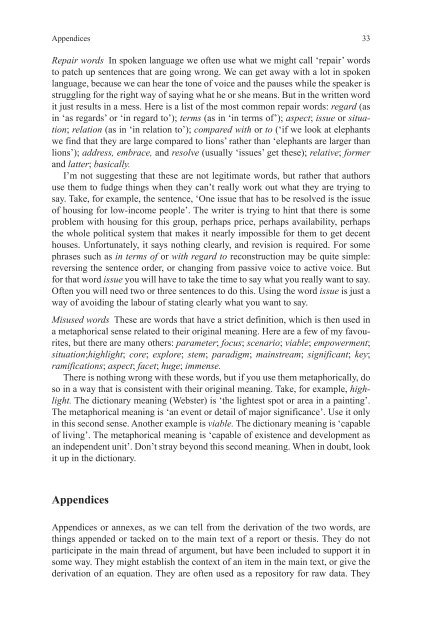

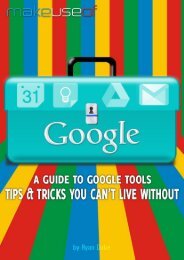
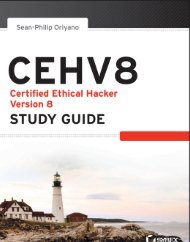




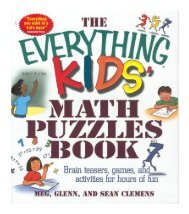



![[Lonely Planet] Sri Lanka](https://img.yumpu.com/59845622/1/169x260/lonely-planet-sri-lanka.jpg?quality=85)

